There’s no doubt that using the right lighting effects in your betta tank can highlight your betta buddy’s colors and make them really pop.
But do betta fish like light?
Bettas are diurnal fish, so they’re most active during the daytime. Your pet needs a clear day/night cycle so that his body knows when to feed and become active and when to rest. So, in that sense, betta fish do like light.
However, leaving the lights on at night can harm your betta, so you must always turn the lighting off when you go to bed.
Read this guide to learn how much artificial light is good for your betta fish tank and more!
Do Betta Fish Like Light, And Is It Necessary?
Betta fish need light to know when it’s time to feed and become active, which is how things work in the wild environment.
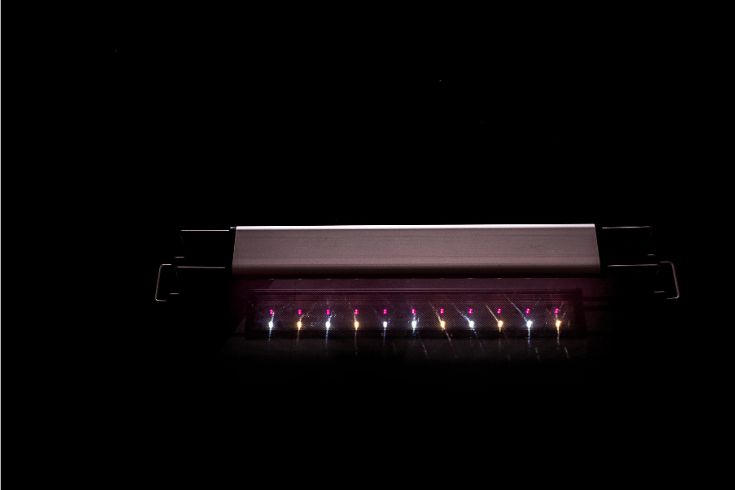
In the natural environment, bettas inhabit shallow bodies of water, such as ditches, marches, rice paddies, and floodplains. These natural habitats are naturally shaded by dense plants and muddy, stagnant water.
That said, bettas gravitate toward the water’s surface to feed and breathe, where there’s more natural sunlight.
Benefits of Aquarium Lighting For Betta Fish
Bettas are diurnal fish, so they’re more active during the daylight hours. When the sun sets, and complete darkness falls, the fish enter their natural sleep cycle.
The fish need that natural day/night light cycle to remain healthy and stress-free. So, to replicate that in captivity, your tank lights should come on in the morning and go out at night.
Is Too Much Or Too Little Light Dangerous For Your Betta?
So, what happens if your aquarium lights are left on for too long or not long enough?
Too Much Light
There are a few problems that could arise if your betta is exposed to too much bright light in the aquarium environment.
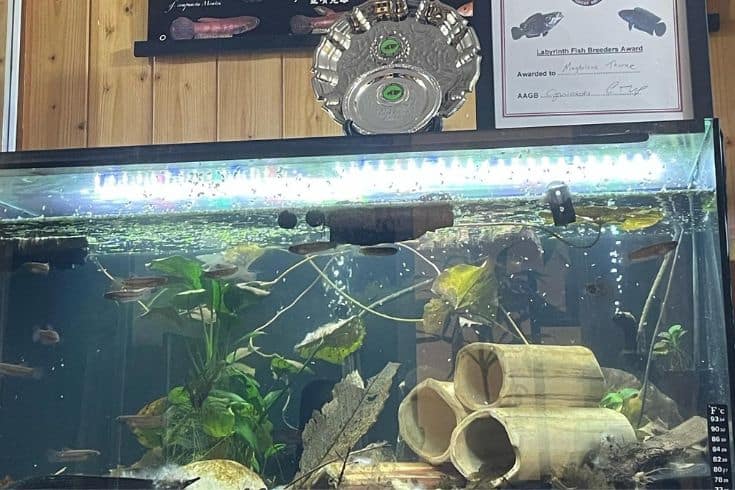
- Too much artificial lighting can overstimulate your betta, causing him to be more active for longer periods than usual. That will stress your pet, leading to health problems, including disease outbreaks and attacks by parasites.
- Bettas can be fussy feeders, and the overstimulation caused by too much light can sometimes cause a betta to stop eating.
- Betta fish need darkness to sleep, so by exposing your fish to too much light, you’re preventing him from resting.
Not Enough Light
So, too much light is a bad thing for your betta fish. But what about too little?
- If your betta is deprived of light, his vibrant colors might fade.
- Bettas are much less likely to spawn when kept in very dim light conditions.
Ideally, your betta should enjoy a period of darkness of around 12 to 16 hours per day with a corresponding day cycle.
Why Not Use Natural Sunlight Instead Of Artificial Light?
If your betta fish needs a natural day/night routine to remain healthy and thriving, why not keep his tank on a windowsill where it will receive lots of direct sunlight?
Unfortunately, using that type of betta tank light is not a good idea!
How so?
Algae Bloom
Algae are tiny aquatic organisms that need sunlight to grow and spread. So, if you keep your fish tank in direct sunlight, an algae bloom will probably result.
Algae are not harmful to bettas; in fact, your betta buddy and his tank mates will most likely graze on the green stuff throughout the day. However, green slime all over your viewing panes, decorations, and plants look gross, so you don’t want too much of the stuff in your aquarium.
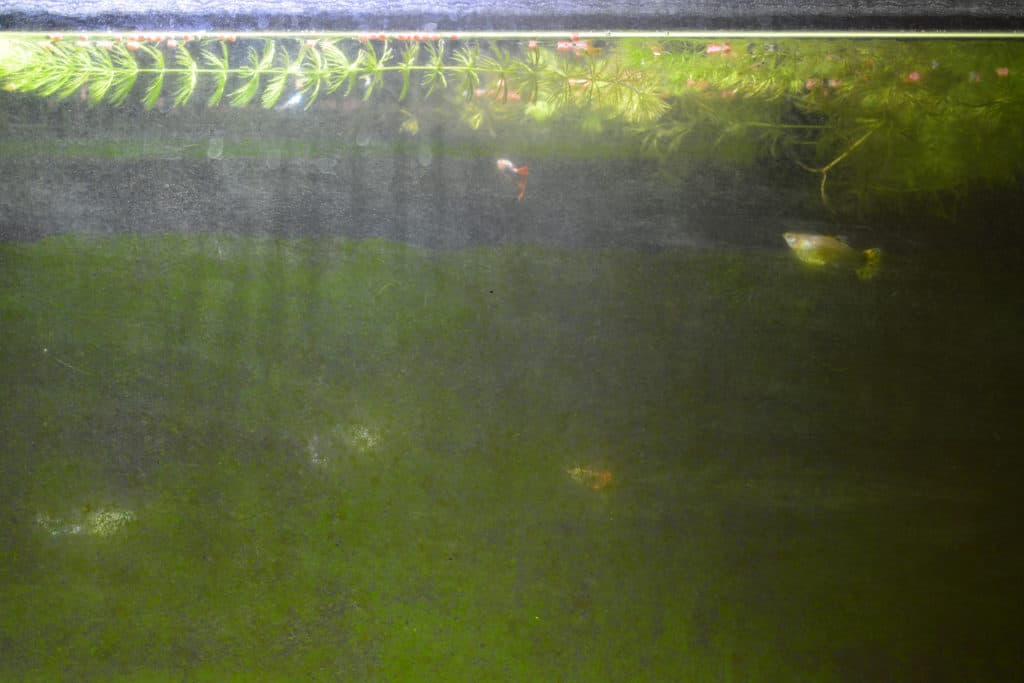
I control the algae growth in my fish tanks by keeping a cleanup crew of Amano shrimp and freshwater snails, both of which are excellent tank mates for bettas and small peaceful fish species.
I also encourage lots of bushy plant growth to outcompete the algae for nutrients, helping to keep their numbers down.
Temperature Shock
If the water temperature in your betta’s tank gets too hot or too cold, your pet will go into temperature shock.
So, although your betta tank needs a heater, placing your pet’s tank in direct sunlight will result in rapid fluctuations in the aquarium water temperature that will stress your betta and possibly even kill him.
In addition, the betta’s labyrinth organ will be damaged if the warm water in the betta aquarium is at a different temperature to that of the room in which the tank is placed.
How Much Light Does A Betta Tank Need?
I recommend providing 1 watt of light per gallon of water in your betta tank or less for LED lighting units and 1.5 watts of light per gallon of water if you’re using fluorescent lighting.
In the wild environment, the betta’s day is somewhat shorter than in his tank. That’s because the heavily vegetated environment blocks out most of the natural light. To replicate that, you need to provide your fish with eight to ten or twelve hours of light every day, followed by 12 to 16 hours of darkness.
Colored Lights
Most fish tank lighting units offer a range of different colors and special effects. Provided you keep to the correct day/night routine, colored lights don’t have any special effect on your betta, although blue lights can show his colors off to the max.
Betta Fish Light Schedule
When it comes to devising a suitable lighting schedule for your betta fish, I recommend either using an automatic timer to switch the aquarium lights on or doing it manually when you get up in the morning.
Leave the lights on for eight to twelve hours during the day, and then set the timer if you won’t be around, or manually switch the lights out when you go to bed.
Do Betta Fish Need Light At Night?
Fish don’t generally need light at night, and betta fish like the dark to sleep.
Nocturnal fish species are specially adapted to navigate around their environment without needing to see where they’re going, and diurnal fish, such as bettas, will be hiding or resting in complete darkness until daybreak.
Can Betta Fish See In The Dark?
So, you know that wild betta fish live in a dark environment, and they are diurnal, but can bettas actually see in the dark?
Can Betta Fish See Color?

Betta fish can see almost the same range of colors as you can, although we think some of the shades and hues that your pet sees are slightly different from ours. That said, some betta species can’t see red light, so are technically colorblind.
The betta fish that live in deeper waters can’t see the color red. That’s because water absorbs colors at different rates, and every color in the spectrum is on a different wavelength. Water absorbs red; first, so many species of deep-sea and river fish can’t detect the color red.
How Do Betta’s Eyes Work?
So, bettas can detect almost the same colors as us, and their eyes work in much the same way but with a few subtle differences.
Unlike many other fish species, betta fish can focus precisely on a single object. However, the image your betta sees will be blurry and contrasted, enabling him to differentiate the object incredibly well through a high-contrast image.
Bettas cannot dilate and contract their iris quickly, taking between 30 to 60 minutes for the iris to adjust one way or the other. That’s why you should always switch on a light in the room before turning on your fish tank light.
Switching on the aquarium light in a darkened room will stress your fishy friend and could potentially damage his eyes.
Monocular Vision
Betta fish have monocular vision, meaning that each eye views a different image. You and I have binocular vision, which means that we can use both eyes to focus on one single thing.
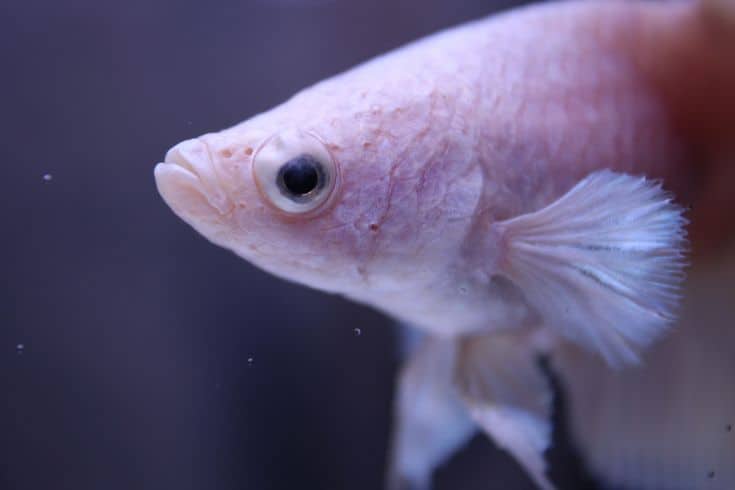
Interestingly, animals with binocular vision are usually predators and have their eyes facing forward. However, those animals with monocular vision generally have their eyes on the side of their heads and are prey species.
Bettas can be prey to birds and larger fish, but they are also hunters and predators. So, their monocular vision enables the fish to be aware of potential threats, while their ability to focus on a single object makes the fish an extremely efficient hunters.
Night Sight?
Your betta’s remarkable eyesight makes him an efficient surface predator, as well as helps to keep him safe. But your fishy friend cannot see in the dark.
So, how does your fish protect himself and find his way around at nighttime?
Lateral Line – Your Betta’s “Sixth Sense”
If you look closely at your betta fish, you will notice a line of tiny holes in the scales that run laterally along the fish’s length.
That so-called “lateral line” allows fish to detect movement, pressure changes, and vibrations in the water. Using that system, the betta can work out the size of objects in the water, especially if that object is moving.
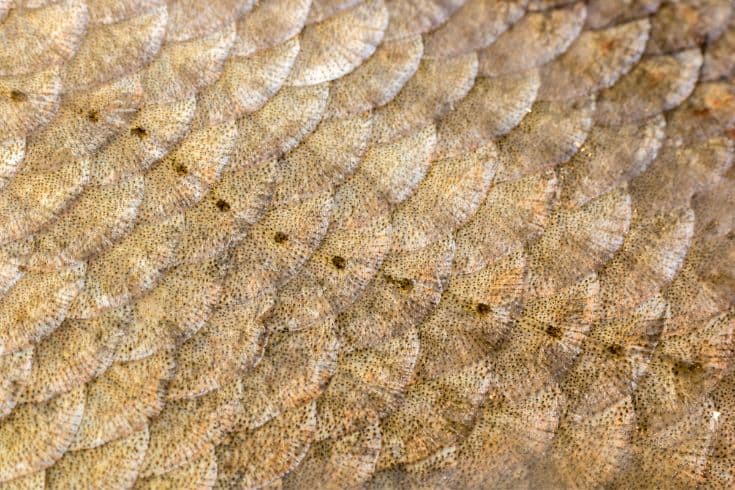
The betta’s brain then processes that information and decides whether to take evasive action to escape from a potential predator or to change course to avoid a collision with something.
So, it’s true to say that betta fish can’t see in the dark, but they can use that incredible sixth sense to avoid trouble and stay safe within the murky waters of their natural environment.
FAQs
Here, we answer a few of your questions about betta fish and aquarium lighting.
Q: What is the best lighting for a betta fish?
A: Standard aquarium lighting is fine for a betta fish and for most beginner-friendly aquatic plants.
Q: Should I leave the light on for my betta fish while on vacation?
A: As a general rule of thumb, betta fish need only eight to ten hours of light per day to remain healthy, and so do your aquarium plants.
When you go away on vacation, I recommend investing in a simple timer for your betta aquarium that you’ll get from a DIY store and setting it to turn the lights on and off at preset times.
Q: Do betta fish like blue light?
A: White or blue LED types of light work best as a light source for betta fish. Blue light provides adequate lighting to enable you to view your fish without overstimulating and stressing them as bright fluorescent bulbs can.
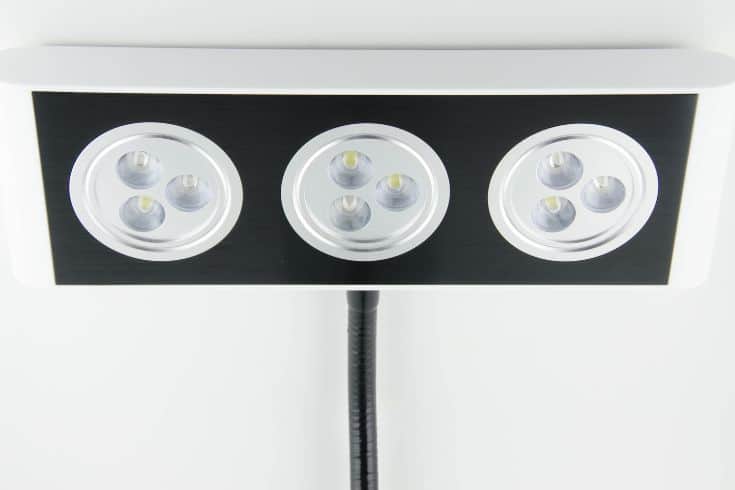
Final Thoughts
I hope you enjoyed our guide to lighting your betta fish tank. If you found the article helpful, please share it!
Betta fish like a clear day/night cycle to keep them happy and thriving. That helps the betta to know when to be active, feed, and rest. Living plants need eight to ten hours of light every day, and that’s perfect for your betta. You don’t need to leave your aquarium lights on at night.
What color lights work best in your fish tank? Tell us in the comments box below.

Wow! That was a lot of good info., as I am considering getting a new betta. My last one jumped to his death while I was away. This new tank has a cover. But thanks a lot for telling me how much light they need to be happy.
I have a Betta and was curious about light/darkness and how to adjust day/night lights for what’s best for my pal and that was such great information. Thank you so very much!